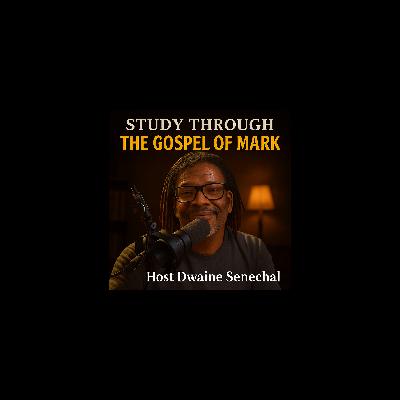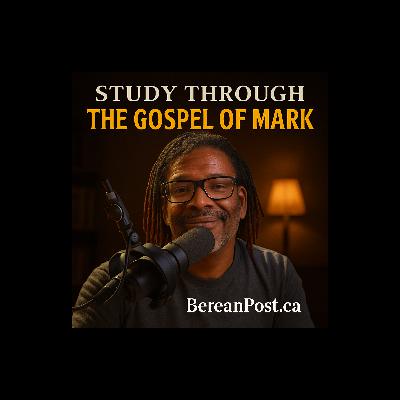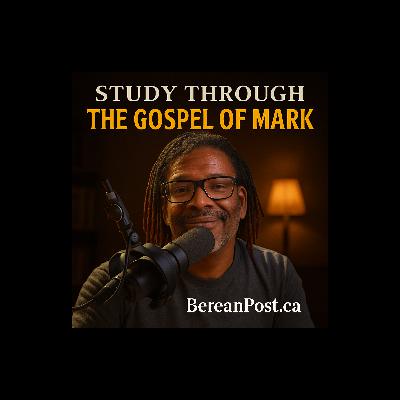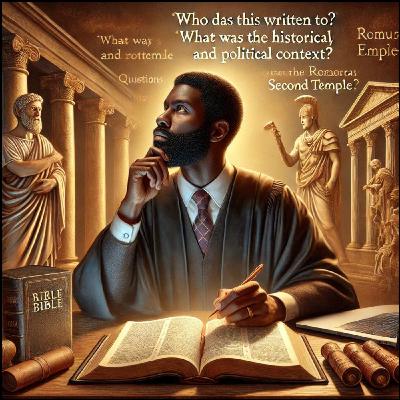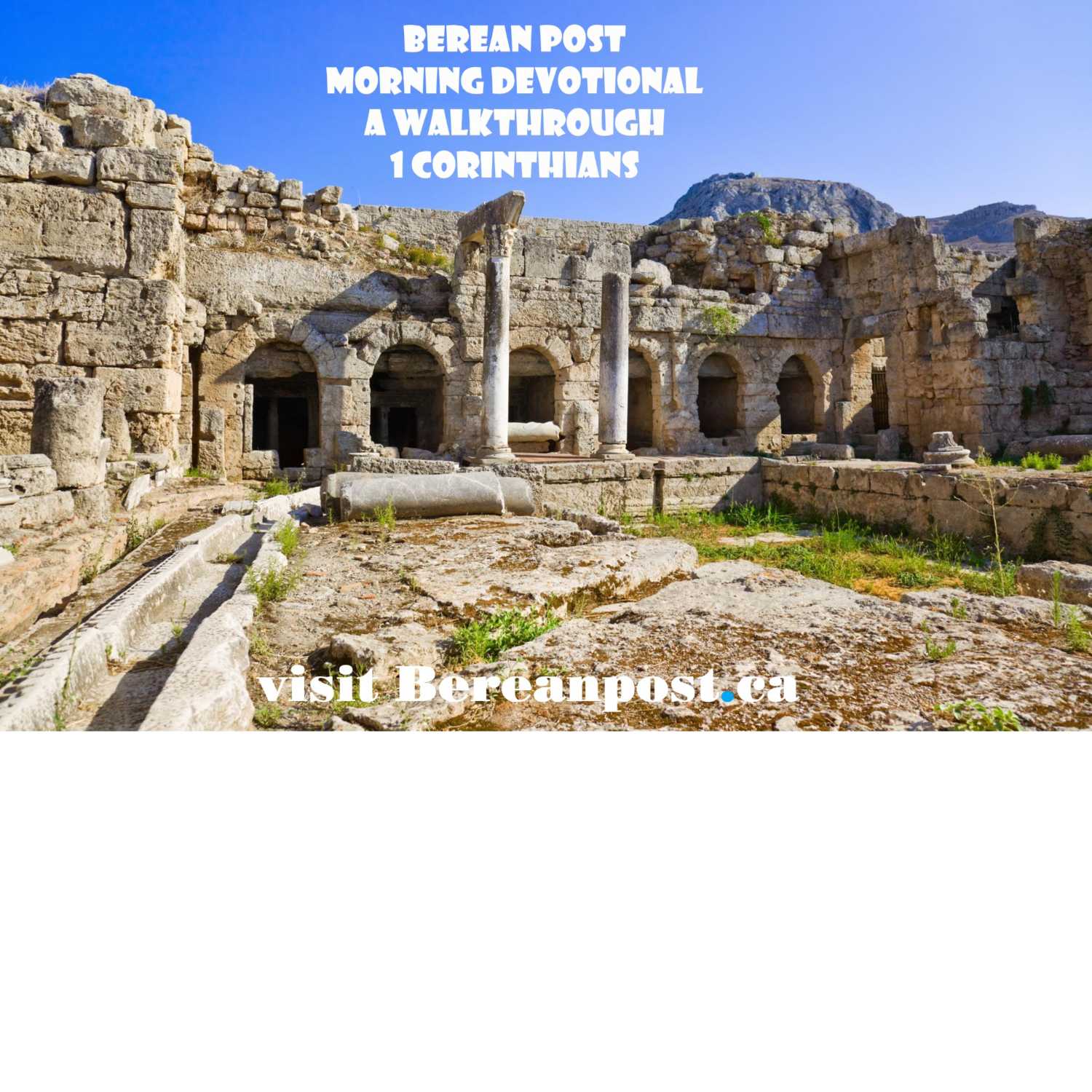Discover The Berean Post Podcast
The Berean Post Podcast

The Berean Post Podcast
Author: Dwaine Senechal
Subscribed: 0Played: 0Subscribe
Share
© Dwaine Senechal 2023
Description
Introducing "The Berean Post Podcast," a show dedicated to exploring current events and issues from a biblical perspective. Hosted by an experienced church leader who has spent years pastoring and planting a church, this podcast focuses on understanding Scripture as a layperson, striving to interpret the text as the first readers would.
170 Episodes
Reverse
Sent With Nothing but Authority | Mark 6:7–13 | Studies in the Gospel of Mark (Ep. 15) Jesus sends the Twelve into the villages with almost nothing. No bag. No money. No bread. Not even a spare tunic. Just the sandals on their feet, a staff in hand, a jar of oil, and His authority. Mark’s account of this sending raises big questions: Why were they told to travel light? Why does Mark say they could take a staff and sandals, while Matthew and Luke forbid them? What did it mean to shake the dust off their feet? And why would Jesus say it will be more tolerable for Sodom and Gomorrah in the judgment than for towns that reject His messengers? In this episode, we’ll step into that moment with the disciples, wrestle with the so-called contradiction between the Gospels, and explore the weight of Jesus’ warning. We’ll also compare His instructions with the Didache — one of the earliest Christian writings — and contrast it with the way many modern “apostles” travel today. Full series available at: https://BereanPost.ca
Do Not Be Afraid, Only Believe | Mark 5:35–43 | Studies in the Gospel of Mark (Ep. 14) The house was chaos. Mourners filled the air with wailing. Neighbors pressed in. Death had taken Jairus’ daughter. But when Jesus walked in, everything changed. In this episode, we continue the story of Jairus, the synagogue ruler who fell at Jesus’ feet begging for his little girl’s life. Too late, the message came: “Your daughter is dead. Why trouble the Teacher any further?” But Jesus answers with words that still echo today: “Do not be afraid. Only believe.” 📖 Anchor Text: Mark 5:35–43 (NKJV) 🔍 Themes Covered: Jesus’ authority over death Fear vs. faith in the face of loss First-century funeral practices and cultural background The power of Jesus’ personal touch and words (“Talitha, cumi”) ✨ Key Takeaways: Faith confronts fear when hope seems gone. Jesus clears away the noise of doubt and mockery. For Him, death is sleep — awaiting His voice. Resurrection is personal: He calls us by name. 👉 Subscribe for more studies through the Gospel of Mark: [channel link] 👉 Visit the blog and podcast archive at https://bereanpost.ca 💬 Share your thoughts: What do Jesus’ words “Do not be afraid, only believe” mean to you today? #GospelOfMark #BibleStudy #DoNotBeAfraid #FaithOverFear #BereanPost
Ep. 13 — Mark 5:25–34 Who Touched Me?For twelve years she lived with rejection, shame, and pain. No doctor could help. No friend could touch her. She was broke, frail, and forgotten. But in one desperate moment, she pushed through the crowd to touch Jesus — and heard the word she never thought she’d hear again: Daughter.In this episode, we step into the first-century world of Mark’s Gospel. We’ll see what this story meant for Mark’s first readers, why Jesus’ response shocked the crowd, and how His compassion for a broken reed still speaks today.Anchor Text: Mark 5:25–34 (NKJV)
Episode 12 — Falling at His Feet: Jairus’ Plea (Mark 5:21–24)A respected synagogue ruler falls in the dust at Jesus’ feet. His only daughter is dying, and desperation strips him of pride and position. In this episode we step into the shoreline crowd of Mark 5:21–24, where faith meets urgency, authority bows before greater Authority, and Jesus begins the walk toward a dying child.Faith isn’t only tested in the cry for help. It’s tested in the wait..
Episode 11 — The Call No One Saw Coming (Mark 2:13–17)Jesus calls a man no rabbi would touch — Levi the tax collector. By nightfall He is eating at Levi’s table, surrounded by outcasts, while the Pharisees look on in shock. For them, holiness meant separation. For Jesus, holiness meant healing.In this episode, we step into the scandal of Levi’s call, see how Matthew, Mark, and Luke each remember the story, and hear what Mark wanted his first readers to understand before we ever ask what it means for us today.The kingdom of God is not for the clean and respectable. It is for the ones everyone else has written off.
Title: Breaking Through the Roof: Jesus’ Authority to Forgive and Heal (Mark 2:1–12)A crowded house in Capernaum. Four friends refuse to give up, tearing open a roof to lower their paralyzed companion before Jesus. Everyone expected a miracle of healing. No one expected forgiveness.In this episode, we explore:Why Jesus spoke forgiveness before healing.Why the scribes accused Him of blasphemy.What “Son of Man” meant to the first-century Jewish mind.How this story still confronts our assumptions today.The miracle proves it: Jesus doesn’t just heal. He forgives. And He still speaks those words today.
Episode 9 — The Bridegroom, the Fast, and the Wineskins (Mark 2:18–22)Why weren’t Jesus’ disciples fasting like everyone else? The Pharisees and John’s followers thought devotion meant going without. But Jesus flips the script: this isn’t a funeral — it’s a wedding feast. He calls Himself the Bridegroom, claiming the covenant role of God Himself, and warns that His kingdom isn’t a patch for old religion. It’s new wine that can’t be contained in brittle skins.In this episode we explore:Why fasting mattered so much in the first century.What it meant for Jesus to call Himself the Bridegroom.The sharp warning of the wineskins parable.How this passage still challenges our traditions today.Jesus doesn’t just fit into our categories — He breaks them. The question is, are we clinging to the old because it feels safe, or stepping into the joy of His kingdom?
Episode Notes The night before, Jesus’ ministry looks unstoppable — crowds pressing, healings flowing, demons shrieking. By any measure, this is “momentum.” But at daybreak, He does something shocking: He walks away.In Mark 1:35–39, Jesus trades applause for prayer, success for solitude, and momentum for mission. While His disciples chase Him down, urging Him to ride the wave, Jesus refuses. His purpose isn’t to build a brand or pack a synagogue — it’s to preach the kingdom, even in forgotten towns no one bragged about.This episode confronts our scoreboard obsession. Do we measure ministry by numbers, or by obedience? Jesus shows us that mission matters more than momentum.
Title: Authority in the House — Mark 1:29–34Description: When Jesus leaves the synagogue, His authority doesn’t stay behind in a sacred building. It walks with Him into Simon and Andrew’s home. There, a fever breaks at His touch. That evening, the whole city crowds the doorway with sickness and demons — and Jesus heals with authority no ritual, no gimmick, and no hype can match.Mark shows us that Christ’s authority is not limited to public worship or religious systems. It enters households, touches families, restores the sick, and silences demons who try to speak in His name. The question is personal: what happens when His authority enters your house?Join Dwaine on The Berean Post Podcast as he unpacks Mark 1:29–34, wrestling with the raw, disruptive power of Jesus — a King who doesn’t need promotion, and who demands a response.
Episode Notes — Ep6: Authority That Shakes the Room (Mark 1:21–28)When Jesus enters the synagogue at Capernaum, His words don’t sound like anyone else’s. The scribes quoted rabbis and recycled tradition. Jesus speaks as the source. The crowd feels it — and a demon can’t stay hidden any longer.In this episode we explore:Why His teaching shocked the synagogue — authority with no borrowed weight.How a demon recognized Him before the congregation did.What real authority looks like when one command sets a man free.Why His words were never just information, but power that reordered reality.Mark shows us that Jesus is not one more religious voice. He is the voice — the authority every other power only pretends to have.
What would make four fishermen drop their nets, walk off the job, and follow a man they just met? In Mark 1:16–20, Jesus’ call doesn’t come with promises of comfort, but with a summons that redefines their lives: “Follow Me, and I will make you fishers of men.”In this episode we explore:Why Jesus’ authority made seasoned workers leave everything instantly.How the first hearers would have felt the shock of this radical call.The difference between adding religion to your life and being completely reoriented by Christ’s voice.What “fishers of men” meant in their world — and what it still means today.Mark shows us that discipleship isn’t a hobby or a side-project. It’s a total reordering of life under Jesus’ authority.
Title: Baptism and Temptation (Mark 1:9–13)Summary: In this episode of Studies in the Gospel of Mark, we look at two short but powerful scenes: Jesus baptized in the Jordan, and then immediately driven into the wilderness. Why did the sinless Son of God step into waters meant for sinners? What does it mean that the Spirit who descended in peace then thrust Him into battle? Mark shows us that affirmation and testing always go together — baptism, then wilderness; voice of delight, then voice of the enemy.Key Points:Jesus identifies with sinners from the very start — standing where the guilty stand.The heavens are torn open, the Spirit descends, and the Father declares: “You are My beloved Son.”The same Spirit immediately drives Him into the wilderness for testing.Testing is not proof of God’s absence — it is proof of His claim on you.Adam fell in a garden, Israel failed in the desert — but Jesus, the true Son, stands victorious.Takeaway: The Father’s affirmation and the Spirit’s testing belong together. If baptism leads to wilderness in Jesus’ life, it will in ours too. The question is not whether storms and trials come, but whether we will stand.
Studies in the Gospel of Mark Episode: Mark 1:1–8 — The Headline, the Prophet, and the Voice in the WildernessIn this episode of Studies in the Gospel of Mark from The Berean Post, host Dwaine Senechal unpacks the explosive opening of Mark’s Gospel. These verses aren’t just an introduction — they’re a confrontation.What You’ll Learn:The Headline (v.1): Why Mark’s use of the word gospel directly challenged Caesar’s propaganda and still confronts our modern “Caesars” of career, politics, and respectability.The Prophecy (vv.2–3): How Isaiah’s words set the stage for God’s kingdom to break into the wilderness, not the marble halls of power.The Messenger (vv.4–6): Why John the Baptist’s wild appearance and radical baptism shocked Israel to its core, and how even Josephus remembered him as shaking the nation.The Contrast (vv.7–8): John’s humility before Jesus, the meaning of untying sandals in rabbinic culture, and how John’s water baptism pointed to the Spirit-filled transformation Jesus would bring.Key Takeaways:Mark’s opening line is treason against Rome and a challenge to every false king we serve today.God often works in wilderness places, away from religious comfort zones.John’s baptism wasn’t about outsiders — it confronted insiders, demanding Israel repent.Jesus’ baptism with the Spirit fulfills Ezekiel 36 and Joel 2: not cleansing alone, but total renewal.Why This Matters:The Gospel doesn’t begin with comfort. It begins with confrontation: Caesar or Christ, ritual or repentance, water or Spirit. The wilderness is still calling — will you go?Resources & References:Roman inscriptions: “Gospel” used for Caesar’s announcements.Josephus, Antiquities 18.117: John the Baptist’s baptism remembered in Jewish history.Talmud, b. Ketubot 96a: Cultural context of untying sandals.Prophets: Ezekiel 36, Joel 2.Next Episode:We’ll follow Jesus into the Jordan, where heaven itself tears open to declare who He is.
In this episode of Studies in the Gospel of Mark, we step back to look at the unique shape and voice of Mark’s Gospel. Who was John Mark? Why does this Gospel read so urgently compared to Matthew, Luke, or John? And what would the first readers — especially in a Roman context — have heard when they opened this text?Mark doesn’t waste words. He moves fast, cuts straight to the action, and forces us to see Jesus as the Son of God breaking into history with authority. Along the way, we’ll explore how Mark differs from the other Gospels, what his background was, and why his message still cuts through the noise today.What You’ll Learn in This Episode:Who John Mark was, and how Peter’s voice shaped this Gospel.Why Mark’s writing style is urgent, raw, and full of the word “immediately.”How Mark’s Gospel compares to Matthew, Luke, and John.Why the first readers — especially Romans — would have felt both scandal and hope.How Mark 1:1 sets the tone for the entire Gospel: “The beginning of the gospel of Jesus Christ, the Son of God.”Why the authority of Scripture matters more than church traditions or celebrity voices.
Welcome to Studies in the Gospel of Mark, from The Berean Post. I’m Dwaine, and this is my journey — not chasing applause, not repeating clichés, but opening Scripture as the first readers heard it: raw, disruptive, and demanding a response.Each episode we’ll walk through Mark’s Gospel passage by passage, painting the scene, feeling the tension, and asking hard questions that don’t let us off the hook.If you want to follow along, visit bereanpost.ca — where you can sign up, dig deeper, and read the blog posts that accompany each study.Let’s open the Gospel of Mark together.
📖 Mark 1:1 - "Beginning" and "Gospel" | A Berean StudyWelcome to our deep dive into Mark 1:1, where we explore the powerful significance of the words "Beginning" and "Gospel" in their original historical and cultural context.In this episode, we’ll discuss: ✅ What "Beginning" meant to Mark’s audience—connections to Genesis, prophecy, and new creation themes ✅ The meaning of "Gospel"—was it just "good news," or something more? How was this term understood in the 1st century? ✅ How Mark’s word choices shape our understanding of Jesus' mission🔎 Studying the Gospel Like a Berean As always, we approach this text with historical depth, scriptural authority, and Berean discernment to uncover its true meaning.📢 Join the Conversation! What do you think Mark wanted his readers to understand about the "Gospel" from the very first verse? Comment below!📚 Explore more studies at The Berean Post.📺 Subscribe & Hit the Bell 🔔 for more deep-dive Bible studies!#GospelOfMark #BibleStudy #BereanBelievers #HistoricalJesus #HisStoryInHistory
Episode Title: Who Wrote the Gospel of Mark? Bible, History, and Tradition ExploredIn this episode, we dive into the authorship of the Gospel of Mark. What does the Bible say? What does history reveal? And how does tradition shape our understanding? Join us as we explore the evidence and uncover the origins of this foundational gospel.
"Introduction to the Gospel of Mark: Exploring the Historical, Political, and Religious Context Dive into the fascinating backdrop of the Gospel of Mark! This video unpacks the historical, political, and religious landscape during the time of Jesus and the early Church. Discover how the Roman Empire, Jewish religious practices, and cultural dynamics shaped the message and themes of Mark's Gospel. We’ll explore The Roman occupation and its impact on daily life. Key political players like Herod and Pontius Pilate. The religious diversity of the time, from Pharisees to Zealots. How Mark's audience might have understood Jesus' teachings and actions. This is the perfect foundation for anyone seeking to deepen their understanding of the shortest yet action-packed Gospel. 📖 Join us on this journey into history and Scripture! Don’t forget to like, subscribe, and share to help others learn about the richness of the Bible’s historical context!"
Join us on a journey through the Gospel of Mark and discover how it inspires us to live purposefully in a world full of distractions. Explore our latest blog post! Read here: https://wix.to/KKbXGmH #GospelOfMark #Purpose #Faith
What would Paul say concerning the concept of denominational churches? We cannot speak for Paul himself, but we can provide some insight based on his writings. Paul's emphasis was on the unity of believers in Christ, as he wrote in 1 Corinthians 1:10, "I appeal to you, brothers and sisters, in the name of our Lord Jesus Christ, that all of you agree with one another in what you say and that there be no divisions among you, but that you be perfectly united in mind and thought."While Paul addressed issues of disagreement and division in the early church, he did not explicitly discuss the concept of denominationalism as we know it today. Still, Paul might encourage Christians to focus more on their shared beliefs and practices and less on denominational differences to promote greater unity and cooperation among believers. At the same time, Paul valued diversity within the church, as he wrote in 1 Corinthians 12:12-27, comparing the body of Christ to a human body with many different parts. So, while he might urge Christians to work towards greater unity, he would likely also recognize and appreciate other denominations' unique contributions and perspectives within the broader church.May we remember that despite our denominational differences, we are all part of the Church of God, committed to living out our faith in the world and growing in personal holiness, just as Paul and the early Christians did.



